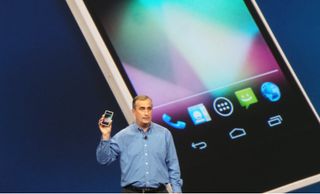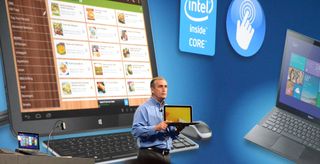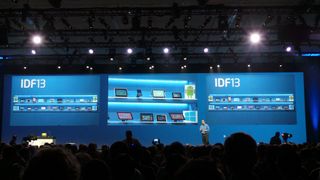Intel CEO outlines aggressive plan to dominate mobile market
14nm Broadwell chips, fanless devices and sub-$100 tablets to ship at the end of 2013.

Intel CEO Brian Krzanich outlined plans to dominate the mobile market by announcing a range of products which the chipmaker will begin shipping at the end of the year.
The strategy includes shipping the first 14nm Broadwell processors for PCs, 22nm Merrifield processors for smartphones with integrated 4G connectivity, and sub-$100 tablets.
"Our plan is to lead in every segment of computing," Krzanich told the packed out auditorium at the Intel Developer Forum (IDF) in San Francisco.
14nm Broadwell-based PC and fanless Core i devices
Krzanich showed off an Ultrabook running on a 14nm Broadwell chip, which will improve on the battery life enhancements brought by the Haswell architecture.
"This is it folks. 14nm is here, it's working and we'll be shipping by the end of this year," he said.
"You saw the performance of Haswell-based systems. The 14nm product provides another 30 per cent power improvement and we're not done yet, that's as far as we've been able to test it so far."
Get the ITPro. daily newsletter
Receive our latest news, industry updates, featured resources and more. Sign up today to receive our FREE report on AI cyber crime & security - newly updated for 2024.
Intel also plans to introduce Haswell-Y devices that will run on 4.5 Watts of power. This will enable OEMs to ship Core i5 and i7 systems without the need for fans. The CEO claimed this will help reduce the weight and thickness of devices without sacrificing performance. Krzanich teased the audience with an unidentified HP system.

Sub-$100 tablets
Intel believes that its ability to provide OEMs with a choice of between Atom and Core architecture, which support Android and/or Windows will also help it to make up ground in the tablet market.
Krzanich claimed that the choice of Intel SoC will also enable OEMs to drive down the price points of tablets, something we will see this Christmas.
"To show you it's not just one device, we show you a wall of devices here with systems that will coming to market with price points, below $100 this holiday," he continued.

Intel's first 22nm smartphone chip with 4G
Intel's chips have been found in a limited number of smartphones in countries such as the UK. The chipmaker plans to change this with the launch of its 22nm SoC processors.
The chipmaker has finally integrated 4G into its smartphone SoCs, the lack of which Krzanich acknowledged was holding Intel back from securing design wins.
"The one thing that has been holding Intel back from this portion of the industry has been our lack of LTE (4G). This phone is working on LTE right now. We're shipping data LTE today. By the beginning of next year we will be shipping voice LTE in our phones."
The 22nm phones will provide a 50 per cent performance gain and longer battery life, and Intel has plans to provide LTE advanced technology in 2014, he added.




